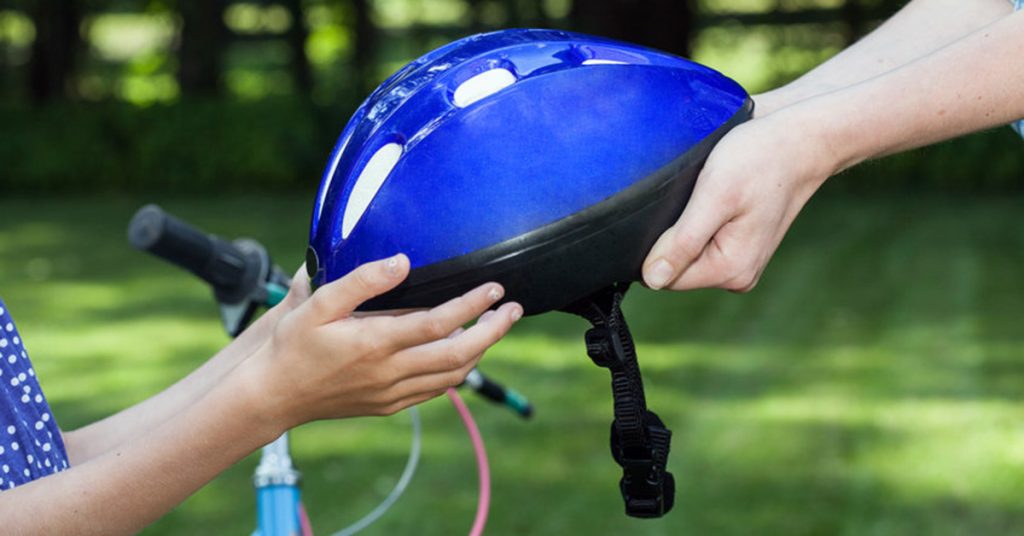Posts Tagged ‘safety’
Helping Children Remember Bicycle Helmets During Back to School

On your mark, get set, go! Breakstone, White & Gluck was pleased to donate bicycle helmets for children at the Arlington Police Department’s Bicycle Safety Day.
For many children, back to school means back to the school bus. But more and more, many students are walking or biking to school.
Back to school is a good time to introduce children to bicycle safety and this year, Breakstone, White & Gluck was pleased to partner with the Waltham and Arlington police departments to give helmets to children.
On Saturday, August 28th, the Waltham Police Department gave away free Project KidSafe helmets to children at the “Meet the New Chief Day.” The Arlington Police Department also gave away free helmets at Bicycle Safety Day on August 24th at Gibbs Junior High School, where many students walk or bike each day to class.
Our Tips to Help Children Wear Bicycle Helmets Back to School This Fall in Massachusetts
A new school year means a new routine. Whether you or your child ride daily or on occasion, we urge you to commit to wearing a helmet.
According to the National Highway Traffic Safety Administration, wearing a properly fitted helmet is the “single most effective way” to reduce head injuries and fatalities resulting from bicycle crashes. The Insurance Institute for Highway Safety reports the majority of cyclists who ultimately die after a bike crash first sustained a head injury as their most significant injury.
Children Must Wear Bicycle Helmets Under Massachusetts Law. Under Massachusetts law, cyclists who are 16 and younger are required to wear helmets when riding a bicycle. Helmets should be properly fitted and meet the safety standards set by the Consumer Product Safety Commission.
Beyond safety, there are other consequences. A police officer can actually impound your child’s bike for up to 15 days if they are caught riding without a helmet in Massachusetts, though many officers work hard to avoid this step and would rather encourage helmet use.
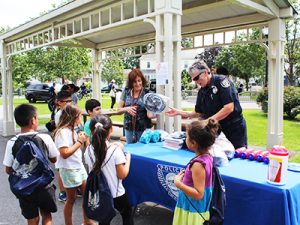
Waltham police officers give away free bicycle helmets at the “Meet the New Chief” event in August.
Why Parents and Adult Cyclists Should Wear Helmets. Cyclists of all ages should wear helmets to protect themselves.
As a parent, if you wear a helmet and make sure your child wears one when you ride together, your child will take notice. They are more likely to wear a helmet even when you are not there and they will have some practice at fastening their own helmet.
Label Your Child’s Helmet. Write your child’s name inside the helmet, on the strap or on the outside of the helmet.
Wear Your Helmet; Do Not Carry It In Your Backpack. Many children (and adults) ride, then put their helmets in their backpack while they are at work or school. Encourage your child to keep their helmet outside their backpack so they put it right on.
Buy a Durable Bike Lock. Purchase a durable bike lock in case your child cannot find their helmet and has to walk or get a ride home from school or a friend’s house. Keep this on their bike at all times. Insist that your child should contact you and never ride without a helmet.
Buy Your Child a Spare Bike Helmet. Purchase your child an extra bicycle helmet now before they misplace theirs. Unless you live near a bike shop, it can be difficult to step away from your routine to go purchase a bike helmet right away, especially during the busy Fall season.
At the same time, purchase a spare helmet for yourself, too. Keep your spare at home or at the office. This will come in handy if you damage your helmet, lose it or decide you want to take the Blue Bikes bikeshare home.
Free Legal Consultation – Boston Personal Injury Attorneys
With more than 100 years combined experience, Breakstone, White & Gluck has been consistently recognized as a top-rated Boston personal injury law firm. Our attorneys specialize in representing those injured by negligent driving, bicycle accidents, premises liability accidents, defective and unsafe products, construction accidents, medical malpractice and wrongful death.
If you have been injured, learn your rights. For a free legal consultation, contact Breakstone, White & Gluck at 800-379-1244 or 617-723-7676 or use our contact form.
Check if Your Trek Bicycle Has Been Recalled
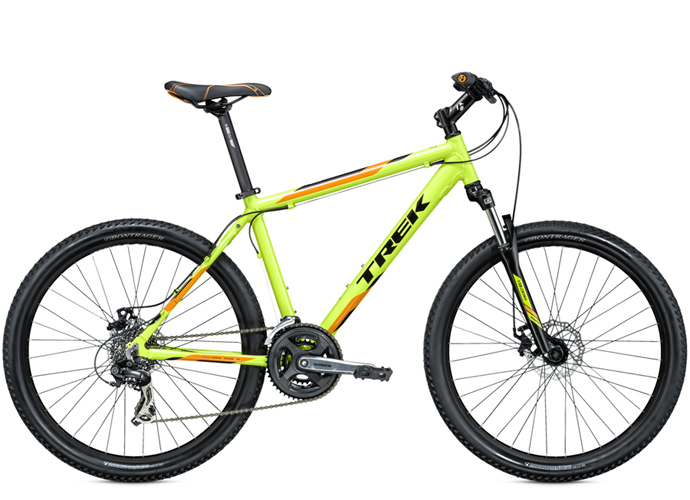
Nearly one million Trek bikes have been recalled after a cyclist was left paralyzed by an accident caused by a defective front disc brake.
About 900,000 bicycles in the U.S. and 98,000 bicycles in Canada were recalled recently by Trek Bicycle Corporation of Waterloo, Wisconsin. The recall involves bicycles sold nationwide from September 1999 through April 2015 for between $480 and $1,650.
Bicycles involved in the recall have a quick release lever on the bicycle’s front wheel hub that can come into contact with the front disc brake assembly, causing the front wheel to come to a sudden stop or separate from the bicycle, posing a risk of serious injury to the rider. Defective bicycles have a front quick release lever that expands beyond 180 degrees.
Trek issued the recall after reports of three injuries, including one person who suffered quadriplegia. A second person suffered facial injuries and another suffered a fractured wrist.
Consumers should stop using these Trek bicycles immediately. Call an authorized Trek retailer for a free inspection and installation of a new quick release on the front wheel of your bike. Trek is trying to encourage cyclists to seek the repair by offering a $20 coupon toward Bontrager merchandise.
Trek has not released a list of specific bicycle model numbers. Cyclists need to check their own bicycles and see if they are impacted by this recall. Some bicycles involved in this recall were purchased many years ago and owners may not have the original paperwork. Or you may have purchased one of these bicycles secondhand.
Do your due diligence and seek out a Massachusetts bicycle shop which sells Trek bicycles. Ask for a free inspection and have them make the free repair if needed.
Find a Trek bike dealer.
Read More
Remember to Change Your Smoke Alarm Batteries
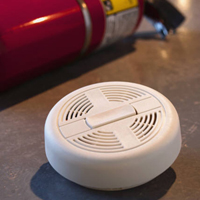 As Daylight Saving Time ends Sunday, we all have a very important chore: changing the batteries in our smoke alarms and carbon monoxide (CO) detectors. The good news is we have an extra hour in the day to get that chore done.
As Daylight Saving Time ends Sunday, we all have a very important chore: changing the batteries in our smoke alarms and carbon monoxide (CO) detectors. The good news is we have an extra hour in the day to get that chore done.
Smoke alarms provide necessary warning for us to act in a fire. Each year, more than 2,200 people die in unintentional home fires in the United States. The greater tragedy is nearly two-thirds of these deaths occur in homes with no smoke alarms or ones which do not work.
Here are a few additional suggestions for Boston and Massachusetts residents:
- You should have working smoke alarms on every level of your home, inside and outside sleeping areas.
- Purchase fire extinguishers for your kitchen, basement, work areas, and garage. Check them every few months to remind yourself of where they are, and make sure they are properly charged.
- Replace smoke alarms every 10 years and carbon monoxide detectors every five years.
- Talk to your family, roommates and landlord about your fire evacuation plan.
- Walk through your home and apartment and practice your fire evacuation plan. In an emergency, you and others may have to pass through unfamiliar areas.
- If you are a Boston college student renting an apartment, make sure you and your roommates are following house rules for cooking and that no one is smoking in the living area.
- Report any potential fire hazards to landlords promptly, including blocked access ways and electrical irregularities.
Preventing Cooking Accidents This Thanksgiving
 Thanksgiving dinner is the largest meal of the year for many families, the one that takes the most planning and time to prepare. As you work in the kitchen, remember Thanksgiving is also the nation’s leading day for kitchen fires and when burns and cooking injuries are more likely to occur. The good news is you can prevent most of these accidents and focus on enjoying the day by following a few simple steps below. We have also included safety precautions for deep frying a turkey.
Thanksgiving dinner is the largest meal of the year for many families, the one that takes the most planning and time to prepare. As you work in the kitchen, remember Thanksgiving is also the nation’s leading day for kitchen fires and when burns and cooking injuries are more likely to occur. The good news is you can prevent most of these accidents and focus on enjoying the day by following a few simple steps below. We have also included safety precautions for deep frying a turkey.
Make sure your smoke detector is working. Test it in advance and do not disable it.
Use a cooking timer. This will help you keep track of when to check the turkey and when other food dishes are finished.
Stay home while cooking. Stay home and check the turkey frequently.
Cooking stovetop. Stay in the kitchen when you are cooking stovetop. If you must leave, turn the stove off.
Keep children away. Keep children at least three feet away from the stove at all times.
Hot food and liquids. Make sure children also stay away from hot food and liquids, which can cause burn injuries. This includes coffee, gravy and the steam and sauce on vegetables – especially when they first come out of the oven or off the stove.
Neat kitchen. Keep clutter to a minimum near the stove. Set aside oven mitts, towels and other utensils. Do not leave sharp knives or utensils out where young children can reach them. Ask guests to put their belongings in another area.
Keep matches, lighters and candles away. Lock matches and utility lighters in cabinets away from children. Also do not use candles if you have young children in the home.
Use a commercial cooking bag. Do not cook your turkey in a brown paper bag from the grocery store. They are unsanitary and may start a fire.
Tips if you are deep frying your turkey:
Read the instructions. Read the manufacturer’s instructions for the turkey fryer before each use.
Understand your propane gas burner. Ask your propane gas provider about safe practices to prevent fires and explosions.
Wear safety gear. Wear safety glasses, gloves which stretch to your elbows, a long-sleeved shirt and an apron.
Deep fry your turkey outside. Set up your fryer in an open area, away from your house, garage, decks and other structures.
Select a smaller turkey. Use a turkey that is 12 pounds or less in size.
Do not stuff the turkey. Stuffing the turkey could interfere with even cooking.
Do not use too much oil. Determine the right amount of oil in advance by placing the turkey in the fryer. Fill with water to the top. Remove the turkey and measure the amount of water remaining. Use the same amount of oil. Your fryer may also have a measurement line inside.
Fully thaw the turkey. Burn injuries can occur when any water on the turkey comes in contact with the oil, then boils over or splatters while being cooked. Fully thaw the turkey and dry it off with paper towels before deep frying.
Turn off the fryer before adding the turkey. Warm up the fryer before cooking, then turn it off just before putting the turkey inside. Start cooking again after it is firmly in place.
Related:
Thanksgiving Safety, National Fire Protection Association.
Cooking Safety, National Fire Protection Association.
Read More
Drownings Claim 90 Children in U.S. Since Memorial Day
 The Consumer Product Safety Commission (CPSC) reports pool drownings have claimed the lives of 90 children in the U.S. since Memorial Day, a sober reminder for parents and caregivers to review how they are protecting their youth.
The Consumer Product Safety Commission (CPSC) reports pool drownings have claimed the lives of 90 children in the U.S. since Memorial Day, a sober reminder for parents and caregivers to review how they are protecting their youth.
These figures were released for Pool Safely Day, an event being observed nationwide this week, from July 22 to July 29, 2012. In Massachusetts, the South Shore YMCA in Quincy and the Boys & Girls Club of Taunton were scheduled to host educational events.
The CPSC reported 90 children under age 15 have suffered swimming pool drownings and an additional 106 children in the same age category have required emergency response for near-drowning incidents at pools. The figures were released by the CPSC’s Pool Safely: Simple Steps Save Lives campaign.
The figures show younger children are most vulnerable, with 72 percent of the drowning victims younger than 5 years old.
Texas saw 13 drownings, the highest number nationwide through the mid-summer report, with California, New York, North Carolina, Ohio and Pennsylvania each reporting 5 swimming pool drownings.
Parents should make sure their children have taken swimming lessons and instruct them on ways to protect themselves, such as to stay away from pool drains, pipes and other openings; stay in certain areas of the pool and only use diving boards after asking parents. Children 13 and older should also be trained in CPR.
Parents and caregivers should also:
- Stay close and alert when watching children in and around the pool.
- Never leave children unattended.
- Learn CPR.
- If you own a pool or spa, make sure it has appropriate safety equipment. At pools, that includes fencing, a lockable safety cover, drain covers which match federal requirements, life rings and a reaching pool. Spas should have lockable covers for when not in use.
Click here for a full list of pool safety tips from the Boston personal injury lawyers at Breakstone, White & Gluck of Massachusetts.
Related:
- Midsummer Drowning Checkup: 90 Child Drownings Nationwide since Memorial Day, Consumer Product Safety Commission.
- Swimming Pool Accidents, Breakstone, White & Gluck.
- Pool Safely website.
- Virginia Graeme Baker Pool & Spa Safety Act, Pool Safely.
Change Your Smoke Alarm Batteries for Daylight Saving Time
 On Sunday, Nov. 6, we turn clocks back an hour as Daylight Saving Time ends. The change from Daylight Saving Time is an important reminder to protect our family and homes by checking and changing the batteries in our smoke alarms and carbon monoxide detectors.
On Sunday, Nov. 6, we turn clocks back an hour as Daylight Saving Time ends. The change from Daylight Saving Time is an important reminder to protect our family and homes by checking and changing the batteries in our smoke alarms and carbon monoxide detectors.
Fire and carbon monoxide poisoning are great concerns as the cold weather arrives and residents make their home heating decisions. Each year, more than 150 people in the United States die from accidental non-fire related carbon monoxide (CO) poisoning. This poisoning is associated with consumer products, such as furnaces, stoves and water heaters.
Even more people die each year in fires. In 2010, 3,120 people were killed while another 17,720 suffered fire-related injuries, according to the National Fire Protection Association. Four out of five civilian fire deaths occurred in the home. These statistics make your work to prepare your home for the winter especially important.
Smoke Alarms: Massachusetts requires a smoke alarm be installed on every habitable level of a residence as well as the basement floor.
There are two types of smoke alarms, photoelectric and ionization. Effective April 5, 2010, only photoelectric smoke detectors are to be installed within 20 feet of kitchens and bathrooms with showers. These alarms are less sensitive and the goal is to reduce nuisance alarms that cause people to disable devices. Both photoelectric and ionization alarms are required in all other areas.
Carbon Monoxide Detectors: Since March 31, 2006, residences have been required to have working carbon monoxide alarms on every habitable level of the home or dwelling unit. Carbon monoxide is a colorless and odorless gas that results from incomplete burning of fuels. The first symptoms of poisoning are similar to the flu and include headache, fatigue and dizziness.
The requirements for meeting the smoke alarm and carbon monoxide detector laws can be met with separate units or with smoke alarms that have carbon monoxide detectors.
Read More
Boston Welcomes New Bike Share Program
Boston has a new bicycle sharing program, implemented on July 28th, and it is off to a great start. The program, which is known as Hubway, stations bicycles throughout the city at terminals. You can rent a bike for a short period of time, or become a member and have a year of privileges.
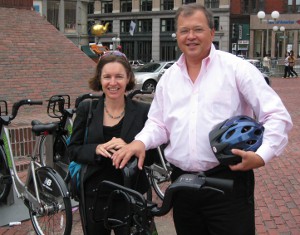
Hubway is another step in making Boston a bicycle-friendly city. The city, under the inspiration of Mayor Menino and with the guidance of Olympic cyclist and Bicycle Program Director Nicole Freedman (shown at right with David White, at the Government Center Hubway Station), has expanded its bicycle lanes and its bicycle parking, and it now has added convenient bicycle rentals.
Hubway deploys 600 bicycles at around fifty stations around the city. A bike can be picked up at one station and parked at another, making the program convenient for commuters, students, and tourists. There is even an phone application called Spotcyle which gives up-to-the-minute data on which terminals have bikes or available parking docks.
David White, one of the attorneys at Breakstone, White & Gluck, called these efforts “great steps to making Boston a safer place to ride your bicycle.” The program will also reduce pollution and promote fitness.
White explained, “Cycling becomes much safer as motorists become more aware of bicycles sharing the roadways. Populating the city with hundreds more bicycles will actually increase safety for all bicyclists.”
Hubway also promotes safe cycling by urging cyclists to always wear a bicycle helmet, and to always observe traffic laws, which apply equally to bicyclists.
White urges Boston cyclists to observe Massachusetts bicycle laws (read more here). He also urges cyclists to check their automobile insurance policies to make sure they have adequate uninsured and underinsured motorist coverage, which provides protection if there is a bicycle accident (read more here).
Congratulations to the City of Boston and Hubway!
Workers’ Memorial Day in Massachusetts Remembers Workplace Victims
Every year, Massachusetts families and organizations come together to honor the men and women who are killed and injured while on the job. This year, on April 28, the Massachusetts Coalition for Occupational Safety and Health (MassCOSH), the Massachusetts AFL-CIO, and the Greater Boston Labor Council are co-sponsoring Workers’ Memorial Day and are publishing the 2011 report: Dying for Work in Massachusetts: Loss of Life and Limb in Massachusetts Workplaces.
“It is critical that Massachusetts employers improve the safety of their workplaces to protect their workers. The high rate of death and injury on the jobsite is still taking a horrible toll on Massachusetts workers and their families. It is also unfortunate that enforcement continues to suffer budget cuts,” said Boston personal injury lawyer David White.
As stated in this sobering report, its purpose is to “highlight the fact that work continues to kill and maim workers in epidemic and alarming numbers. The saddest aspect to this loss in lives and limbs is that work-related injuries and illness are preventable.”
The report describes in clear detail the tragedy facing Massachusetts workers and their families. In 2010 alone, 47 Massachusetts workers lost their lives while on the job. (Breakstone, White and Gluck has the privilege and honor of representing the family of one of these deceased workers in their claim for his pain and suffering and wrongful death while on the job.)
The top three causes of fatalities among Massachusetts workers in 2010 were transportation (12 deaths: drivers or workers on roads involved in motor vehicle accidents and plane/helicopter crashes), falls (9 deaths: half being construction site accidents), and commercial fishing (4 deaths).
On Workers’ Memorial Day, we honor the fallen by demanding stronger workplace health and safety protections under the Occupational Health & Safety Administration, because it is every person’s right to be safe in their own work environment.
Join us on Thursday April 28, 2011 from 12:15 to 1:15 p.m. outside the Massachusetts State House as we mourn for the dead and fight for the living.
Breakstone, White & Gluck is a proud sponsorof MassCOSH, an organization with a great reputation for protecting workers and improving workplace safety.
Cook Safely This Thanksgiving
 As your family prepares for Thanksgiving, a lot of thinking goes into what will be on the Thanksgiving table. But more important than what you put on your table is how to cook the delicious food ….safely!
As your family prepares for Thanksgiving, a lot of thinking goes into what will be on the Thanksgiving table. But more important than what you put on your table is how to cook the delicious food ….safely!
Thanksgiving is the leading day for cooking fires in the United States. Three times more cooking fires occur on Thanksgiving than on the average day. In 2008, fire departments responded to 1,300 home cooking fire accidents on the holiday, compared to 420 on an average day, according to the National Fire Protection Association.
Cooking is a leading cause of fires year-round. Two out of every five home fires in the United States result from cooking. Between 2004 and 2008, an average of 460 people died in cooking fires. Three of every five people who suffered personal injury were hurt trying to extinguish the flames themselves.
Protect your home and family this holiday with these tips:
- Unattended cooking is the most common way kitchen fires get started. Do not leave the kitchen while using a stovetop. If you must leave, turn the stovetop off until you return.
- Be alert. Do not cook if you are tired or have consumed alcohol.
- Clear your stove of anything that could catch on fire, including oven mitts, utensils and towels.
- Use a cooking timer so you do not forget you are cooking.
- Do not leave the house when cooking.
- If you are deep frying, go outside. Do not stuff the turkey. When deep frying, use turkeys that are 12 pounds or less in size. Avoid using too much oil by doing a preliminary test using water. Place the turkey in the cooking utensil and add water to cover. When you remove the turkey, measure the amount of water. Use the same amount of oil.
- Do not cook your turkey in a brown paper bag from the grocery store. They are unsanitary, emit toxic fumes and may ignite under the flames. Use a commercial oven cooking bag.
- If you do have a cooking fire, leave quickly. Do not try to put out the fire yourself. Close the door to contain the fire. If you do attempt to fight the fire, make sure others leave and you have a clear exit.
For more information on Thanksgiving cooking safety, visit the websites of the National Fire Protection Association and the USDA Food Safety and Inspection Service.
FDA Issues Tylenol Safety Warning
The Food and Drug Administration is urging parents to choose generic children’s medications over Tylenol as it broadens its investigation into manufacturing facilities operated by Johnson & Johnson and its subsidiary, McNeil Consumer Healthcare.
New product safety concerns have arisen in the weeks after an April 30 recall involving McNeil’s Fort Washington facility in Pennsylvania, prompting the FDA to start investigating other manufacturing sites. McNeil recalled 43 over-the-counter children’s medicines it manufactures for Johnson & Johnson, including various flavors of liquid Tylenol, Motrin, Benadryl and Zyrtec. The FDA has not said how many facilities are being investigated.
McNeil Consumer Healthcare issued the April 30 recall voluntarily in consultation with the FDA. In a visit to McNeil’s Fort Washington facility, FDA officials uncovered inconsistent active ingredient concentrations, extremely potent metal particles in some medicines, an inadequate testing facility, poorly trained employees and drums of raw materials contaminated with bacteria.The full inspection report is available here.
Meanwhile, the House Committee on Oversight and Government Reform is scheduled on Thursday, May 27, 2010 to hold a hearing on the recent Tylenol recalls and whether McNeil properly handled consumer complaints. In a recent Fortune Magazine interview, Johnson & Johnson Chief Executive William Weldon admitted that his company owed an apology. Mr. Weldon has been invited to testify at the May 27 hearing.
The Pennsylvania facility has since been shut down but may resume operation once, according to Johnson & Johnson spokesman James Freeman, “we have taken the necessary corrective actions and can assure the quality of products made there”.
Tylenol has been involved in other product safety recalls in recent years. In 2008, McNeil recalled 51 types of Tylenol after consumer complaints of diarrhea, vomiting and other illness. The company said the medications – mostly all for children and infants – had been contaminated by trace amounts of a chemical used in shipping.
In 2008, McNeil recalled 21 types of children’s and infants’ Tylenolbliquid products, saying an active ingredient did not meet all quality standards.
For additional information on the Johnson & Johnson recalls, see the FDA’s website.


